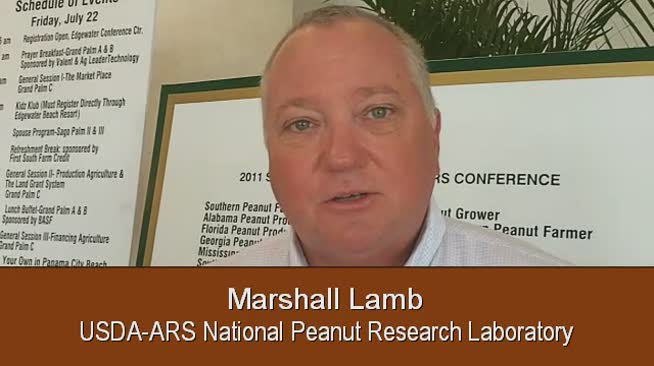July 26, 2011

Marshall Lamb, research leader, with the USDA-ARS National Peanut Research Laboratory in Dawson, Ga., says the 2011 peanut crop year has been “interesting.”
The Southwest is “in a long drought and has a huge acreage cut. The Southeast crop started out slow with a lot of drought early,” but recent rain has generated some optimism. “We’ve moved from a situation of cautious pessimism to cautious optimism,” Lamb said at the recent Sothern Peanut Growers Conference in Panama City Beach, Fla.
“Southeast growers have a better attitude because of recent rainfall,” Lamb said.
Crop uncertainty has kept prices high, Lamb said. “Prices are still strong because of supply and demand. Demand is increasing.”
He said quality problems with the 2010 crop in the Southeast kept a lot of peanuts out of the edible market. “Growers have benefitted from higher prices.”
He said not many growers are signing contracts now but prefer to “wait and see” what might be available at harvest.
Lamb also commented on key research initiatives at the National Peanut Research lab.
“Water use efficiency is the number one priority for research,” he said. “That’s especially true with the drought in Texas.”
He said Texas growers should be able to make more peanuts with the same amount of water or the same amount of peanuts with less water.
He said water issues are not unique to the Southwest. “We have intermittent drought in the Southeast as well.”
He said “anything we can do to reduce the cost of production,” will be a research priority. Genetics will play a big role in improving efficiency, he said. Varieties with improved disease resistance and other production advantages will be part of ongoing research and breeding efforts.
“Improved genetics will be critical.”
Lamb said looking into nutriceutical aspects of peanut breeding will also be important. “We know peanuts are excellent sources of protein and a good bang for the buck for moms, but we want to increase vitamins and minerals and get nutriceutical characteristics in peanuts.”
You May Also Like




